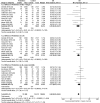Prophylactic Probiotic Supplementation for Preterm Neonates-A Systematic Review and Meta-Analysis of Nonrandomized Studies
- PMID: 33460432
- PMCID: PMC8321836
- DOI: 10.1093/advances/nmaa164
Prophylactic Probiotic Supplementation for Preterm Neonates-A Systematic Review and Meta-Analysis of Nonrandomized Studies
Abstract
Systematic review and meta-analyses of randomized controlled trials (RCTs) show that probiotics reduce the risk of necrotizing enterocolitis (NEC ≥ Stage II), late onset sepsis (LOS), all-cause mortality, and feeding intolerance in preterm neonates. Data from observational studies is important to confirm probiotic effects in clinical practice. We aimed to compare outcomes before and after implementing routine probiotic supplementation (RPS) in preterm neonates (<37 weeks of gestation) by performing a systematic review of non-RCTs using Cochrane methodology. Databases including PubMed, The Cumulative Index to Nursing and Allied Health Literature (CINAHL), Embase, Cochrane Central library, and Google Scholar were searched in May 2020. A meta-analysis was performed using a random effects model. Categorical measure of effect size was expressed as OR and 95% CI. Statistical heterogeneity was assessed by the chi-squared test, I2 statistic. The level of evidence (LOE) was summarized using GRADE (Grading of Recommendations Assessment, Development, and Evaluation) guidelines. Primary outcomes were NEC ≥ Stage II, LOS, and all-cause mortality. Secondary outcomes included probiotic sepsis. Thirty good-quality non-RCTs (n = 77,018) from 18 countries were included. The meta-analysis showed RPS was associated with significantly reduced: 1) NEC ≥ Stage II (30 studies, n = 77,018; OR: 0.60; 95% CI: 0.50, 0.73; P <0.00001, I2: 65%; LOE: Moderate), 2) LOS: (21 studies, n = 65,858; OR: 0.85; 95% CI: 0.74, 0.97; P = 0.02, I2: 74%; LOE: Low), and 3) all-cause mortality (27 non-RCTs, n = 70,977; OR: 0.77; 95% CI: 0.68, 0.88; P = 0.0001, I2: 49%; LOE: Low). Subgroups: 1) extremely low birth weight (ELBW: birth weight <1000 g) neonates: RPS was associated with significantly reduced NEC ≥ Stage II (4.5% compared with 7.9%). However, there was no difference in LOS and mortality. 2) Multistrain RPS was more effective than single strain. One study reported 3 nonfatal cases of probiotic sepsis. In summary, moderate- to low-quality evidence indicates that RPS was associated with significantly reduced NEC ≥ Stage II, LOS, and all-cause mortality in neonates <37 weeks of gestation and NEC ≥ Stage II in ELBW neonates.
Keywords: necrotizing enterocolitis; neonates; outcomes; preterm infant; probiotics; very low birth weight.
© The Author(s) 2021. Published by Oxford University Press on behalf of the American Society for Nutrition.
Figures





References
-
- Rees CM, Eaton S, Pierro A. National prospective surveillance study of necrotizing enterocolitis in neonatal intensive care units. J Pediatr Surg. 2010;45(7):1391–7. - PubMed
-
- Kim JH. Neonatal necrotizing enterocolitis: clinical features and diagnosis. In: Steven A, Abrams MSK, editors. UptoDate. Waltham (MA): UpToDate (accessed 2020 April 23).
-
- Bisquera JA, Cooper TR, Berseth CL. Impact of necrotizing enterocolitis on length of stay and hospital charges in very low birth weight infants. Pediatrics. 2002;109(3):423–8. - PubMed
Publication types
MeSH terms
LinkOut - more resources
Full Text Sources
Other Literature Sources
Medical

